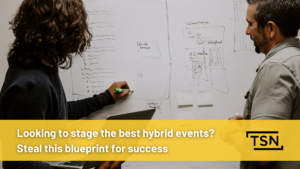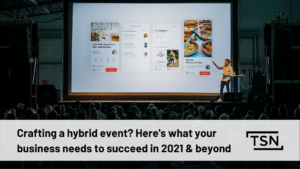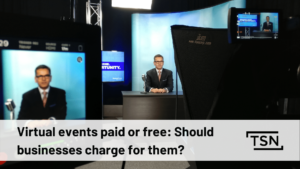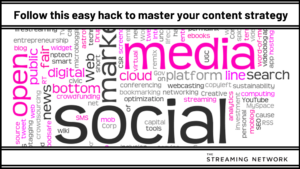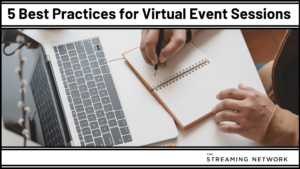Companies that used to put on one- or two-day events for clients to discuss issues and trends affecting their sectors moved online in 2020 as virtual events.
These corporate virtual events are like live events in that they attract key players within your sector who want to talk about major trends, while providing a platform to exchange ideas and network with fellow professionals. Many that The Streaming Network produced in 2020 even featured help desks, delegate lounges and sponsor booths, mirroring live events in every way possible.
These have become even more bold in 2021, there’s no denying it. As with live events, all the effort and components that go into producing a virtual event can be for nothing, if you do not craft engaging, memorable individual sessions that inspire audiences.
So, what’s the secret to creating truly engaging virtual event sessions?
We’re here to breakdown that process. Here are five best practices that you should follow, whether you’re a beginner or a more seasoned producer, to master this critical marketing tool.
1. Source the right content.
The core of a good virtual event session is content. But you can’t use just anything – it needs to be something that resonates with your target audience.
Most businesses are overly focused on the topic they want to talk about, whether it’s about how successful their business is or how great their team is, but this can be a mistake. What you should focus on is what your audience wants to talk about. That’s when thought leadership truly becomes a powerful marketing tool.
So, what should you provide?
If you need ideas, it’s a good idea to start by talking to people on the frontlines of your business (i.e., your sales team or customer service reps) as they’ll highlight the current pain points of your audience.
In terms of your content, we find case studies to be highly effective. They tell people what you’ve been able to do for other customers without explicitly trying to sell them on your product and/or service. You’re explicitly talking about client success, but you’re also subtly suggesting that if they switch from another company to yours, this is what they can expect.
Other content suggestions include sector specific research studies, keynotes and panel discussions with leading executives.
A word of caution – avoid trying to cover too much material at once. This is not a best practice. Part of the appeal of case studies, for example, is that their conflict-resolution structure makes it easy for the audience to pick up and synthesize all the information.
Overstuffing your session diminishes its value. You want your audience to walk away feeling that they received something worthwhile; they won’t get that if you make the topic too broad.
2. Tell an engaging story.
Everybody likes a good story but not everyone feels that they can tell a good one. The common refrain is that they’re woefully underprepared and can’t cook up anything good.
However, that’s simply not true. We all have this ability, especially when it’s something we care about. Stories forge connections among people, and between people and ideas.
When it comes to your virtual sessions, you also need to tell a story to hook in our audience. If you care about what you’re conveying and have the right audience, they will care too. Pick the most salient tidbits to get your point across best.
3. Use an appropriate presenter & host.
Even with the best material, you still need the right presenter and host to carry your sessions.
Contrary to what you might think, the best presenter is not always the smartest person in the room. If they are too high level to speak to your target audience, viewers will feel disconnected from your story.
A host on the other hand is responsible for keeping the presenter on track, monitoring them so that they cover the key topics without rambling and going over the allotted time. In our experience, the best hosts can elevate the talent and make your sessions that much more engaging.
4. Format your content appropriately.
Beyond having the right content, you need to present it accordingly. You’ll want to do the following:
- Be minimalist with your PowerPoint presentations. Use as few words as possible while including striking images to capture people’s attention. If anyone wants to know more about a specific topic, provide a link to your downloadable assets.
- Use the right medium to tell your story. You can use everything from videos to open-ended questions to make your point.
As we mentioned before, you want to provide your audience with just enough information to understand the topic, while leaving breadcrumbs for them to follow if they want to know more.
5. Use real world data to inform your promotional strategies.
Virtual events don’t sell out like physical events, so you need to take a different approach to promoting them.
Based on our recent take on how to promote your virtual events, we recommend a four-to-fived week promotional campaign. The goal is to avoid over-communicating/over-promoting, as people will tune you out and unsubscribe from your emails.
You’ll want to get your event into people’s minds but space things out. Unlike the early birds in live events, the ones that sign up early for your virtual events are less likely to show up. It’s the final week where the magic happens, as most registrations occur just before kick-off – focus on generating excitement then.
If you need more help with webinars or virtual events, reach out to the experts at The Streaming Network today! And check out our state of the art Engage Webinars platform.
We’re passionate about creating compelling virtual events that people want to attend.

